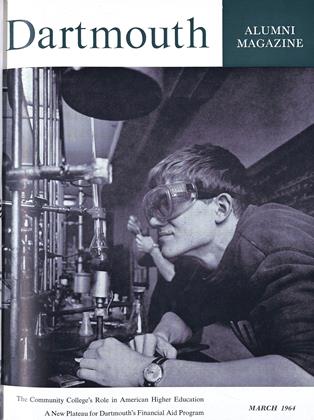By theMarquis de Chastellux. A Revised Translation, with Introduction and Notes, byHoward C. Rice Jr. '26. Chapel Hill:University of North Carolina Press, 19632 vol., 688 pp., $15.00.
In the winner of the Manuscript Award of the Institute of Early American History and Culture, Mr. Rice has restored for current reading an extremely interesting ac- count of Revolutionary America, and at the same time has done a piece of translating and editing which is of extraordinary quality. Mr. Rice clearly enjoyed it all, and his pleasure in it comes through to the reader who benefits by his years of - not labor - but devoted and enthusiastic investigation.
The Marquis de Chastellux came over here as a major general under General and Comte de Rochambeau in 1780, with the French army that landed in Newport, R. I., took part in the Yorktown campaign of 1781, returned to New England in 1782 and to France early in 1783. To please his friends he wrote an account of what he saw on three tours made during slack military seasons—one, from November 1780 to January 1781, from Newport to Philadel- phia and Albany and Saratoga; another in April 1782 from Williamsburg, Va., out across the Blue Ridge and back; a third in November and December 1782 from Hart- ford, Conn., to Portsmouth, New Hamp- shire, back to Boston, Providence, Bethlehem, Penna., and Philadelphia. Travels like these, by a military man, may not seem too interesting, but they were. Chastellux was typically of the Enlightenment - a soldier, a highly-educated gentleman, an author, a friend of Voltaire and Buffon, a member of the French Academy. It is true he was concerned with camp sites and battle fields, but he was much more interested in nature, in the manners and customs of the in music and art, in politics and society. He knew Washington, Jefferson, Samuel Adams among many others, and wrote what he thought about them, often at length. His Travels were best sellers in his day, in French editions of 1786 and 1788, several German editions, an English translation in 1787, and American editions in 1827 and 1828. Then, for some reason, they were neglected, read only by the occasional scholar. Chastellux is not de Tocqueville, but he writes with charm, with discernment, with sympathy for the new nation, and with a life not found in the volumes of his later and more profound compatriot. Mr. Rice has contributed a fine translation, and very full and useful notes on a wide variety of topics - notes well worth the reading for all of us, and full too of material for the scholar. We should thank him for the splendid edition of the Travels.
Mr. Rice lists (pp. 43-62) famous libraries where early editions of the Travels may be found. For him and others interested in Dartmouth, we can say that Baker Library has copies of the fairly rare pirated Frankfort and Leipzig edition of 1786, the second French edition of 1788-91, the first American edition of 1827, and of course the handsome new edition of 1963.
Professor of History
 View Full Issue
View Full Issue
More From This Issue
-
 Feature
FeatureTHE COMMUNITY COLLEGE
March 1964 By THOMAS E. O'CONNELL '50 -
 Feature
FeatureA New Plateau for Financial Aid
March 1964 -
 Feature
FeatureBOSTON'S 100th ANNIVERSARY DINNER
March 1964 -
 Article
ArticleA graduate of 1804 who stood up for an American Culture
March 1964 By BEN HARRIS McCLARY -
 Article
ArticleTHE UNDERGRADUATE CHAIR
March 1964 By DAVE BOLDT '63 -
 Article
ArticleTHE FACULTY
March 1964 By GEORGE O'CONNELL
HERBERT W. HILL
-
 Books
BooksA SYNOPTIC HISTORY OF THE GRANITE STATE,
February 1940 By Herbert W. Hill -
 Books
BooksTHE UNITED STATES.
June 1954 By HERBERT W. HILL -
 Books
BooksTHE EARL OF LOUISIANA.
October 1961 By HERBERT W. HILL -
 Books
BooksMITRE AND SCEPTRE.
MARCH 1963 By HERBERT W. HILL -
 Books
BooksIDEAS, WEALS, AND AMERICAN DIPLOMACY: A HISTORY OF THEIR GROWTH AND INTERACTION.
OCTOBER 1966 By HERBERT W. HILL -
 Article
ArticleThose Early Days of Alumni College
MARCH 1971 By HERBERT W. HILL
Books
-
 Books
BooksFACULTY PUBLICATIONS
-
 Books
Books"Chemistry of the Opium Alkaloids"
March 1933 -
 Books
BooksDEMOCRATIC GOVERNMENTS IN EUROPE:
October 1936 By A. H. Basye -
 Books
BooksTime and the Rivers
March 1979 By Dan Nelson '75 -
 Books
BooksNOT FOR HYPOCHONDRIACS WE TAKE TO BED
April 1931 By Herbert F. West -
 Books
BooksLET THEM EAT PROMISES: THE POLITICS OF HUNGER IN AMERICA
JULY 1970 By MICHAEL P. SMITH

